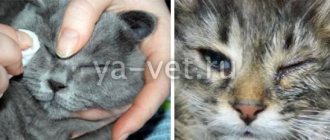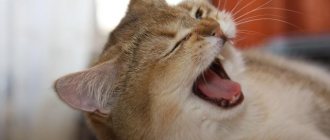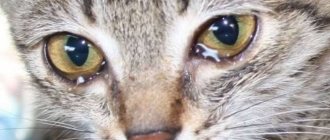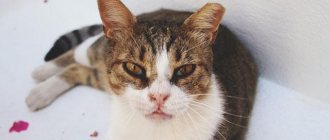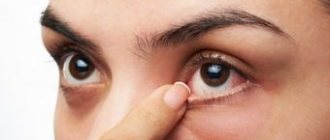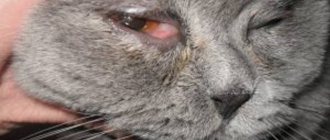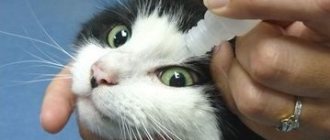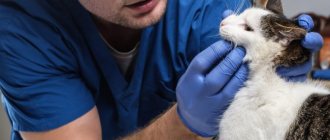Hello everyone!
“First aid” for our own “harmless” runny nose is droplets. And you can run to work. But when our eyes water and fester... We don’t run anywhere - we sit at home and get treated properly.
If our beloved pet—the cat’s eyes and nose are running—our concern has every reason: after all, any illness, if left untreated, becomes dangerous. Including the “banal” cold, which cats supposedly don’t get. They're sick! Yes, less often than us, but like us, due to hypothermia, drafts, cold food and low immunity.
So why does this happen and what should we do? That is the question!
The most common reasons
Has your cat started sneezing frequently, has snot and tears flowing from her eyes and are you seriously worried? But this can happen for understandable reasons, for example, if the cat has swallowed dust. Remember the consequences after you try to pepper the soup, or tickle your nose with a feather, then you walk around and sneeze all day. Believe me, not all cats enjoy this.
Kittens and cats sneeze if:
- If you caught a cold - a standard case that causes sneezing, a constant companion in the form of a runny nose is provided;
- They suffer from allergic reactions to various drugs, products and chemicals. In this case, sneezing is a completely understandable reaction of the cat’s body trying to get rid of the allergen;
- There are viral infections in the form of rhinitis, herpes or adenovirus;
- Breathing is complicated by the presence of growths or polyps in the nasopharynx;
- The presence of chronic asthma is another reason for sneezing in a cat;
- The presence of a malignant tumor or formations that make breathing difficult in the nasal cavity;
- The animal suffers from chronic diseases of the teeth or gums;
- Parasites operating in the animal’s body disrupt the natural processes of respiration.
Now let's talk more about allergies in cats. After all, it is often she who becomes the reason for the frequent pronunciation of the phrase: “be healthy, Murzik.”
So, the list of allergens.
- Household chemicals - detergents, cleaning agents, disinfectants, powders, sprays and other products for cleaning the house and outside.
- Cigarettes, or rather smoke, poisoning everything around and making it difficult for your pet to breathe.
- All types of fungi on tiled surfaces. In a word, a paradise for the proliferation of all kinds of bacteria and lack of hygiene in one bottle. Cats don't like this at all.
- If you use perfume or eau de toilette, or hairspray, remember to do this in a ventilated room. Another reason for the development of allergies in cats.
- Spray products that we use to kill mosquitoes, flies and other insects in the summer will also not add health to your cat.
- And the reason that completes this hit parade is pollen and flowering plants, which cannot be avoided in the spring and summer.
All of the above, as a rule, leads to the development of allergies in a cat , as it irritates the mucous membrane and causes a flurry of snot and makes the cat constantly sneeze, causing inconvenience to you and the animal.
Why does a cat sneeze, have watery eyes or a stuffy nose: causes and symptoms
Sneezing occurs for a number of reasons.
Why does a cat sneeze and his eyes water?
The most common of them is inhalation of dust, which leads to irritation of the mucous membrane. But sometimes this sign, combined with lacrimation, is one of the signs of a pathological process.
Possible reasons:
- Allergy. If your pet has an allergic reaction, it can be recognized by frequent sneezing. This is especially true after direct contact with the allergen. Additional signs: skin rash, shortness of breath, vomiting.
- Cold. When the body is hypothermic, in addition to the main symptoms, there is nasal discharge, fever, and cough.
- Infectious pathologies. The cause of development is fungi, bacteria, infections. Symptoms of diseases can vary dramatically, but there are also common signs: weakness, apathy, lack of interest in food and games, upset bowel movements, mucous discharge from the eyes.
- Foreign body stuck in the nose. Cats can get fine gravel, insects, blades of grass, and more in their noses. In this case, the sneezing is constant, hiccups are constantly rubbing the nose with the paw. Additional symptoms: restless behavior, difficulty breathing, and in some cases, bleeding from the nose.
- Polyps. Formations in the nose can also provoke sneezing, which is combined with heavy discharge, as well as snoring.
- Asthma. Additional signs include difficulty breathing, hoarseness, weakness, apathy, and attempts to swallow air.
- Oncology. This reason is extremely rare. In addition to general symptoms, the presence of malignant tumors can be recognized by bleeding, excessive lacrimation, sudden weight loss, and loss of smell.
- Internal parasites. When worms infect the respiratory system, symptoms similar to a cold also appear. The presence of parasites can be recognized by the depressed state of the cat, hair loss in clumps, sudden weight loss, and intestinal dysfunction.
How to diagnose the disease yourself?
As a rule, any organism strives for self-healing; this is inherent in the nature of any creature, including cats.
Therefore, symptoms in the form of a runny nose are quite normal, they are simply freed from dust particles, foreign bodies and other nasties. With the help of observations and simple actions, we can independently understand the nature of the disease that has overtaken our pet. A cat's refusal to eat and constant attempts to rub its nose indicate a runny nose and a cold. In this case, everything will work out if you take action in time.
Identifying an eye infection is also quite easy. Its symptoms are an increased sneeze reflex and watery eyes. There may be reasons for this. It's not difficult to figure them out. The main thing is not to consider this as the norm. This is a more serious disease, and accordingly the treatment method will be different.
Our curious little pets have the ability to climb into any jar, smell, taste, lick. Unfortunately, this can lead to more severe allergies. Be vigilant and try to remove all dangerous materials. If everything has already happened, find this remedy and act according to the situation.
Foreign objects that get into the nasopharynx will not give rest to the cat. He will do his best to try to get rid of it through snorting and intensive nose scratching.
But combined with bad breath, swollen gums and purulent processes, this is a rather unpleasant signal and a visit to the dentist will be very necessary. Long-haired cats may have watery eyes from their own fur.
As a rule, discharge comes in different colors and indicates different symptoms, causes and diseases. Green or gray snot when sneezing indicates the presence of a fungus or infection in the body. Colorless discharge combined with watery eyes indicates the presence of an allergy.
It is not always possible to identify diseases such as asthma on your own. But if this is so, then irritants and all unpleasant odors must be eliminated from the home or pet’s habitat.
Could these be symptoms of dangerous diseases?
If a kitten or adult cat's eyes are watery and he/she is sneezing, a serious medical condition may be present. Only a veterinarian can diagnose it, so if you notice additional symptoms, you should immediately consult a doctor.
Dangerous accompanying symptoms:
- The cat vomits frequently and has diarrhea.
- The color of the eyes changed and became darker.
- Sudden weight gain or loss.
- Fever and high temperature.
- Lethargy, apathy.
- Blood in the discharge from the nose or eyes.
- Severe swelling of the mucous membranes.
- Cough and difficulty breathing.
- Skin rashes and ulcers.
The presence of these symptoms may be a sign of feline immunodeficiency virus, rhinotracheitis, calicivirus, infectious diseases and other diseases dangerous to pets.
Important: if you pick up a pet and it exhibits similar symptoms, do not rush to take it home to other animals, they may become infected with one of the infectious diseases.
Treatment of sneezing
So, if your baby or cat has a runny nose and starts sneezing, drops prescribed by the doctor will come to your aid. They will fight all bacteria, and soon your cat will regain peace of mind and health. Just drip into food until symptoms disappear .
In most cases, foreign objects can be removed from the nose on your own. But if you are not confident in your own abilities, hand the animal over to specialists, they will do everything right. If the foreign body is a nasal tumor, immediately hospitalize your pet; he needs surgery.
If a dental examination gives disappointing results in the form of problems with teeth, gums or inflammation, then you know which doctor can help in this case. After all procedures, symptoms should stop.
Allergy to mold is treated by eliminating this very mold and various ointments for external use. Remember, excluding the external irritant from the cat’s environment will reduce the allergy to nothing. If it's all about infection, then drugs based on natural plants .
Remember, care, care and compliance, following all doctor’s orders and observing basic hygiene rules can work wonders. Wash your hands after and before handling the cat, and dry your eyes with a clean towel. If your condition worsens, contact the clinic for help.
What if both at the same time?
Transparent discharge from both the eyes and nose, as well as sneezing, are symptoms of eye inflammation, which you can first try to treat at home: rinse with warm chamomile infusion. But only if no other deterioration is observed. However, even here, a doctor’s advice will not hurt, because a runny nose that is not completely cured can become chronic (and even... turn into pneumonia!).
If wheezing and swelling of the eyelids are added, then an allergy is quite possible (the same signs with an accidental one-time inhalation of powdery or sharp-smelling household chemicals). The condition will worsen if treatment is not started! Before visiting a doctor, try to first identify the allergen yourself (house dust, fungi and mold, plant pollen, household chemicals or strong odors, cigarette smoke) in order to relieve the sufferer from it.
If pus also flows along with the above, an increase in body temperature is already life-threatening symptoms of damage to the respiratory tract.
Manifestations of a viral infection, in addition to everything else, include poor appetite, lethargy, fever, sneezing, coughing, and dehydration. Serious, responsible and long-term treatment will be required.
How to treat at home?
If you decide to treat your cat at home, then remember that this should be done based on the cause of the disease:
- Worms can be cured with special medications. Including Bothionol and Phenothiazine.
- Lysine is effective against sneezing caused by herpes.
- Mold allergies are treated with special ointments.
- If the cause is dental, the doctor will give the necessary recommendations and prescribe medications.
- Keeping your cat away from the source of your allergy, keeping your home clean, and monitoring your cat's activities will be an effective way to combat allergies.
Allergic reaction
The most common allergens in cats include air fresheners, laundry detergent, household cleaning products, cat litter, perfumes, perfumes, etc. Often allergies in cats are caused by the presence of mold in the apartment, pollen from indoor and outdoor plants. Smoke can be a strong allergen and irritant for a cat if there is smoking in the apartment. Any aerosols intended to treat cats against skin parasites (fleas in cats) can lead to a sneeze reflex. Sneezing in a cat may occur when the owners used sprays and aerosols to kill insects in the apartment. In case of an allergic reaction, in addition to sneezing and the cat, other symptoms may be observed: itching (dermatitis in cats), lacrimation (conjunctivitis in cats).
Preventive actions
As they say, it is better to prevent a disease than to cure it. Various preventive measures will help you avoid troubles such as sneezing and snot in your cat. One of the effective measures is vaccination! If you regularly carry out examinations and give your cat vaccinations, you can avoid allergies and other diseases of this kind. So don’t delay getting vaccinated.
Here is a list of diseases for which a cat needs regular vaccination:
- Rabies.
- Leukemia.
- Cat flu and various viral infections.
Let your pet live a fulfilling and healthy life. Do not spread illnesses , maintain hygiene and pay attention to the slightest deviation from your usual state. Give love and daily, monthly, and annual care. Prevention is better than cure. Believe me, nothing human is alien to our pets. And they also want to be strong, well-groomed, healthy and attractive to the opposite sex. So give them this opportunity!
Why does a cat sneeze at normal body temperature in the absence of other symptoms of illness?
Some cat owners often panic and do not know what to do if the cat sneezes at normal body temperature and normal health. Let us immediately reassure you that in this case there is no reason for special concern. Ordinary house dust can cause your pet to sneeze. The answer to the question why a cat sneezes is often quite simple: the cat’s nasal mucosa is irritated as a result of heavy dust in your apartment. All you need to do is carry out a thorough wet cleaning of the room and this factor that is harmful to the cat and causes sneezing will be eliminated. It will become easier for your pet, and you yourself, to breathe if you additionally get rid of unnecessary old things and carpets that absorb dust.
When figuring out why your cat often sneezes, you definitely need to check your nose for foreign matter. The cat usually removes small foreign objects by sneezing. If it is large, then using tweezers you can try to remove the object yourself. If this cannot be done, you will need to seek help from a veterinary clinic.
However, the process of sneezing in a cat is not always so harmless. The reasons why a cat sneezes can be serious and pose a threat to the animal's health . Such reasons include :
